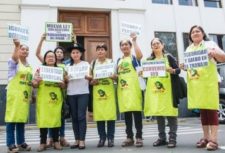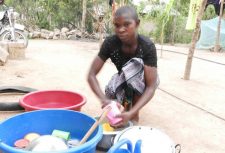Disclaimer: This article is more than 11 years old, and may not include the most up-to-date information or statistics. Please verify information with more recent sources as needed, and if you have any questions contact our Press Office.
25 February 2013
Ten international organisations called on ministers of labor around the world to ratify the ILO Domestic Workers Convention to protect the rights child domestic workers. The coalition sent a joint letter released today.
The International Labour Organization’s convention, has been adopted in June 2011 to protect the rights of an estimated 50 million domestic workers, including an estimated 15 million children. These children often work long hours for little pay, and are particularly vulnerable to physical, psychological and sexual abuse.
The Domestic Workers Convention extends basic labour rights to domestic workers, who are often excluded from national labor laws. Under the convention, domestic workers are entitled to the same rights as other workers, including weekly days off, limits to hours of work, minimum wage coverage, and overtime compensation.
The convention also obliges governments to take steps to eliminate child labor in domestic work and to protect child domestic workers who can work legally, by setting a minimum age for domestic work in line with existing ILO conventions and ensuring that work by children above that age does not deprive them of education.
The letter’s signers urged governments to use the World Day against Child Labor, which ILO decided will focus on child domestic labour, to announce publicly that they have ratified the convention or intend to. The alternative date for the announcement could be the 3rd Global Conference on Child Labor, hosted by Brazil from October 8-10 in Brasilia, that will bring together thousands of delegates and an estimated 140 governments to accelerate global action to eliminate child labor.
Seven countries have already ratified the convention — Uruguay, the Philippines, Mauritius, Nicaragua, Bolivia, Italy and Paraguay.
The organisations signing the letter included: child rights, human rights, and humanitarian organisations that operate in more than 135 countries worldwide. They are: Amnesty International, Anti-Slavery International, Defense for Children International, Child Rights International Network, Global March Against Child Labor, Human Rights Watch, the International Domestic Worker Network, International Labor Rights Forum, Plan International, and World Vision.
Audrey Guichon, Child Domestic Workers Programme Co-ordinator at Anti-Slavery International said: ‘Child domestic workers need effective laws which are tailored to the unique nature of their work inside a private household. ILO Convention 189 is a big step towards achieving real legal protections for child domestic workers. Now it is crucial governments ratify the Convention and make these protections a reality.





